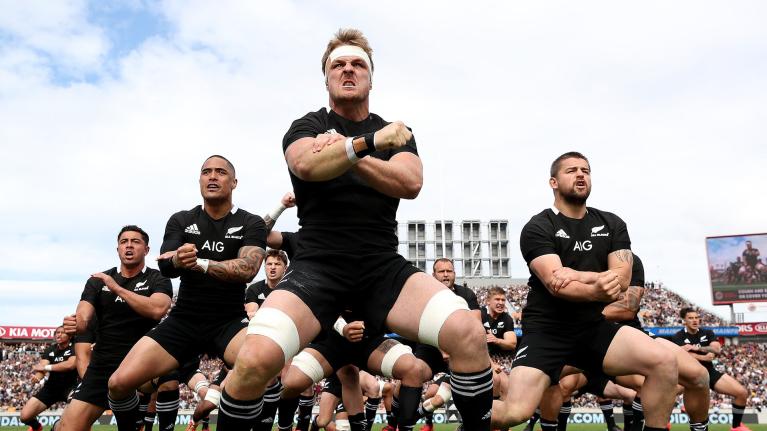'The All Blacks have proven nothing': The truth behind New Zealand's Bledisloe Cup II victory

The All Blacks have proven nothing and frightened no-one.
Sure, their in and out-house public relations departments have been quick to acclaim Sunday’s 27-7 win over Australia, but no markers were put down and no critics answered.
If you can tackle the All Blacks, you will beat them. End of story.
We take a rather dim view of defence, in this country. We think it’s negative and dull.
But that’s also one of the reasons why teams such as England and Ireland and South Africa have beaten us in recent times.
We look at all the individual talent sprinkled throughout our side and imagine them running over and around various defenders.
And we bemoan breakdown cheats and cowardly referees who don’t allow us to recycle the ball as quickly as we’d like to or who let opposition backlines creep up offside, without ever learning to admire or adjust to what the other side are doing.
Let’s assume Ian Foster was the architect of the All Blacks’ attack over recent years. That was certainly the man’s stated area of expertise, anyway.
Dating back to the British and Irish Lions series we have seen the All Blacks consistently fail against teams that can tackle. No matter where we try to set up forward pods or how deep our backs stand or how many crosskicks we resort to, we still have no method of combating any defensive accuracy.
Australia missed 40 tackles against New Zealand on Sunday and we still only won 27-7. Far from being encouraged by the final score, we all ought to feel a little frightened.
Let’s say the Wallabies did tackle on Sunday. Let’s say they didn’t turn the ball over 20 times as well. Without those gifts, and the dreadful option-taking of Australia first five-eighth James O’Connor, how were the All Blacks planning to score any points or exert even a modicum of pressure?
It was very sad to see All Blacks loosehead prop Joe Moody concussed during Sunday’s first half. But when he was on the park, along with Wallabies tighthead Taniela Tupou, the All Blacks’ pack was getting towelled up.
https://www.instagram.com/tv/CGf1Xe9A3bY/?utm_source=ig_web_copy_link
New Zealand’s forwards finished the better. No-one disputes that. But when the starting packs were on, Australia’s was better and this in a situation where the All Blacks were said to be smarting from their sluggish outing the week before.
Heaven help us when New Zealand’s forwards are guilty of resting on their laurels.
Let’s count the individuals who played well for the All Blacks. In no particular order you’d say Anton Lienert-Brown, Sam Cane, Beauden Barrett, Caleb Clarke, Ardie Savea and even sub TJ Perenara enjoyed some eye-catching moments.
Each made what you might call memorable effort plays or strong individual carries that underlined the brittle nature of Australia’s defence and erratic kick-chase. Those remain strengths of the broader New Zealand game and the All Blacks will always prosper against suspect defensive sides.
Just as, when left embarrassed, they’ll invariably rouse themselves into a more robust performance.
Australia were that suspect defensive side and the All Blacks were embarrassed, in the wake of the previous week’s 16-16 draw in Wellington, and yet the final score was just 27-7.
Does anyone think that shook the Springboks to the core or that Eddie Jones has suddenly rethought England’s tactics for the rest of this Rugby World Cup cycle?
Or will the rugby world content themselves with the knowledge that not much is going to change about the All Blacks and that you will still be able to tackle them into submission?
Again, you don’t want to decry the effort of certain individual All Blacks, but the keyword here is individual.
On the right day, against the right opposition, individual brilliance will still be enough for New Zealand to win matches. The challenge for Foster and his staff is to create the gameplan and cohesion required to beat teams that don’t make the plentiful errors Australia did on Sunday.
We might have to swallow a bit of pride to achieve that and might have to resort to such foreign ideas as playing good field position and kicking our goals and backing our own defence to win us matches. Instead, we’re all in a mad rush to proclaim that Caleb Clarke is the next Jonah Lomu.
We remember the 1995 Rugby World Cup for all sorts of reasons, in these parts, but rarely for the quality of South Africa’s defence. So good was it that even Lomu, in his absolute pomp, couldn’t crack it.
Twenty-five years on, making your tackles is still the quickest route to victory over our All Blacks’ sides..
Latest Comments
Yeah he’s just the backups backup instead, so he still needs to be playing 10 constantly.
The four other franchises are the ones looking likely to produce someone to take his position in the team.
Go to commentsThere’s certainly an expectation about Kailea JM, and I think you’re right about his prospects. Does feel like Hodgman has come past him though, on current form. And he’s only 31, I had it in my head he was older than that..
Go to comments